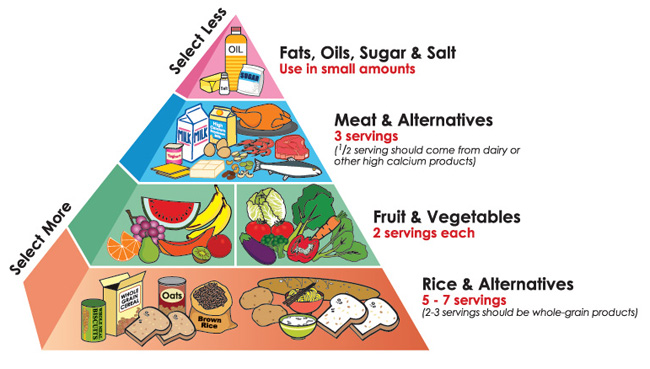What is cholesterol?
Cholesterol is a waxy, fat-like substance found in body cells of humans and animals. Sometimes cholesterol is referred to as "good" cholesterol and "bad" cholesterol. Actually these descriptions refer to the substances called lipoproteins that carry cholesterol throughout the body in the bloodstream. Lipoproteins are a combination of varying amounts of fats and proteins.
What is "good" cholesterol?
"Good" cholesterol is associated with high density lipoproteins (HDLs). HDLs are believed to remove excess cholesterol from the body, therefore higher levels of HDLs are also believed to be associated with lower rates of heart disease.
What is "bad" cholesterol?
"Bad" cholesterol is associated with low density lipoproteins (LDLs). LDLs carry cholesterol in the blood to body cells. High levels of LDLs are usually associated with an elevated blood cholesterol and an increased risk of heart disease due to cholesterol and fat being deposited in the arteries. These fatty deposits decrease the interior size of the arteries so the blood supply is reduced, thus increasing the risk of heart disease and stroke.
How can HDL and LDL levels be controlled?
There is no proven way to control HDL and LDL levels, but diet may play a part. Current studies are also showing that exercise may increase "good" cholesterol levels in some individuals.
Where does cholesterol come from?
Cholesterol in the body comes from two major sources. foods of animal origin, such as meat, milk, and eggs, are one source. The other major source of chotesterol is that which is produced by the body, the majority of which comes from the liver.
What does cholesterol do in the body?
Cholesterol is required for the formation of bile acids, which are needed for fat digestion. It is also used to make important hormones such as estrogen and progesterone and is involved in the formation of vitamin D in the skin.
What are the effects of excessive cholesterol and fats in the diet?
Much controversy exists about fat, cholesterol and heart disease. some medical experts believe that consumption of high levels of saturated fat and cholesterol lead to high blood cholesterol and, in turn, to an increased risk of heart disease. yet, other experts state that there is still no proof that reducing consumption of cholesterol will effectively reduce the incidence of heart disease. Other factors that have been strongly implicated in heart disease are stress, high blood pressure, smoking, obesity, diabetes, and a family history of heart disease.
How does dietary fat influence cholesterol?
To protect your heart, experts recommend that you reduce your overall fat intake - a measure considered by many to be even more important than eating less cholesterol. About 30% of our calories should come from fats. Currently, most Americans get about 41% of their calories from fat. another protective measure involves replacing some of the saturated fats you now consume with polyunsaturated fats found in veqetables and fish. Saturated fats raise cholesterol levels in the blood while polyunsaturated fats lower them. Although it was once believed that monounsaturated fats had no effect on blood cholesterol levels, recent research studies suggest that a diet high in monounsaturated fatty acids is effective in reducing LDL levels while keeping HDL levels the same.
Dietary fats are made up of three types of fatty acids: saturated, monounsaturated, and polyunsaturated. Fats containing a large amount of saturated fatty acids are hard at room temperature; less saturated fats are soft or liquid at room temperature. Thus, beef fat is more saturated than chicken fat and vegetable shortening is more saturated than vegetable oil. The table below shows the fatty acid composition of a number of food fats.
How can cholesterol and saturated fat intake be lowered?
avoid high cholesterol foods such as
egg yolk 213 mg
shrimp (3 1/2 oz., cooked) 96 mg
beef liver (4 oz., cooked) 500 mg
butter (1 tablespoon) 31 mg
whole milk (1 cup) 35 mg
cheddar or swiss cheese 1 oz 28 mg
cottage cheese, 4% (1/2 cup) 17 mg
include lower cholesterol foods such as
Egg white 0 mg
Egg substitute 0 mg *
Fish (4 oz., cooked) 75 - 100 mg
Beef, pork or lamb 100 - 115 mg
Veal (4 oz., cooked) 145 mg
Poultry 4 oz 0 - 110 mg
Dried beans and peas 0 mg
Vegetables and fruits 0 mg
Margarine 0 mg
Skim milk (1 cup) 5 mg
* Some egg substitutes do contain cholesterol. Check the label to be sure!
Select lean cuts of meat.
Serve moderate portion sizes.
Replace animal fats with appropriate substitutes.
Instead of: Use:
Butter,
bacon or bacon fat a
nd chicken fat Vegetable oils or margarine
Sour cream Low-fat yogurt
Whole milk Skim milk
Whole milk cheeses* Low-fat cheeses (made from low-fat or skim milk or vegetable oils)*
Whole eggs Egg white or egg substitute
Remember, cholesterol is found only in animal products. plant foods (fruits, vegetables, and grains have no cholesterol unless animal fats are added in preparation or seasoning.)
Article Source and Thanks to
Food and Nutrition Specialist
Anita Wehrman, B.S., R.D.,
College of Human Resources
University of Delaware |












